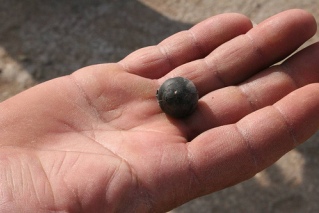
The Israel Defense Forces must end its use of rubber bullets as a means to disperse demonstrations in the occupied territories, the Association for Civil Rights in Israel (ACRI) and B’Tselem have demanded in a letter to Deputy State Attorney for Special Matters, Attorney Eli Abarbanel. The move comes following numerous instances of death and injury to unarmed protesters by rubber bullets, and following the injury of B’Tselem spokesperson Sarit Michaeli during a demonstration last month.
The letter, sent earlier this week, asks the state to provide the organizations with its current procedures regarding the use of rubber bullets by police and military forces active in the occupied territories, and act immediately to prohibit the further use of rubber bullets as a dispersal method at demonstrations in the West Bank.
In the past year B’Tselem has documented over ten instances of rubber bullets being fired at citizens who did not constitute threats to military forces during demonstrations or protest events. B’Tselem has filed four demands for investigations to be opened following protestor injuries from rubber bullets in 2013.
On Friday 19 July 2013, while filming a weekly demo at the village of Nabi Salah, B’Tselem spokesperson Sarit Michaeli was injured in the leg from a rubber bullet shot at her by a Border Policeman from a range of around 20 meters. Since 2000, at least 19 Palestinians, including 12 minors, have been killed by rubber bullets. Most recently, Mohamed Asfur, 23, a student from the Village of ‘Abud near Ramallah, was shot in the head with a rubber bullet during a demonstration of solidarity with Palestinian prisoners in March 2013 and died two weeks later at Ichilov Hospital in Tel Aviv.
In 2000, following the deaths of 12 Arab citizens of Israel and one Palestinian, a panel of inquiry headed by Supreme Court Justice Theodore Or was established. The Or Commission concluded that rubber bullets are fatal weapons and recommended the abandonment of their use as a means to disperse demonstrations. In a 2012 response to a B’Tselem enquiry to the Attorney General sent in 2008, then-Deputy State Attorney Shai Nitazan (now Deputy Attorney General) claimed that the Or Commission findings do not apply to the occupied territories. Nevertheless, Nitzan wrote that “after examining all the aspects concerning the use of rubber bullets, we have established limitations and conditions for the use of rubber bullets whose purpose are to prevent unnecessary harm to civilians.
According to Attorney Raghad Jaraisy of the Freedom of Protest in the Occupied Territories project at ACRI, “the Sarit Michaeli incident is one of many. The same thing has happened to scores of demonstrators in the territories over the past few years, something that points to one of the two following conclusions: either the rules of engagement in the West Bank generally allow the firing of rubber bullets at unarmed demonstrators, or the rules of engagement are violated on a regular basis. Either way, the State Attorney must intervene immediately and correct the situation.”
Jessica Montell, Executive Director of B’Tselem: “In recent years we have warned the operational and military law enforcement agencies many times about illegal and dangerous use of crowd control weapons, especially firing rubber coated metal bullets in violation of the open fire regulations, and the firing of tear gas canisters directly at protestors. The answer we encountered is primarily a denial of the problem’s existence. The military’s apologetic attitude towards violations of the law and military orders facilitates the continuation of the phenomenon and endangers the lives of demonstrators.”
- To read the full letter to the Deputy State Attorney (in Hebrew) click here.
- To read B’Tselem’s 2013 report on Israel’s use of crowd control weapons in the West Bank (in English) click here.
- Rights of protesters in the West Bank – all you need to know.







